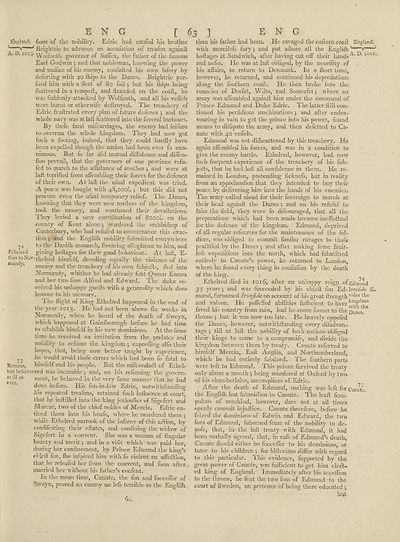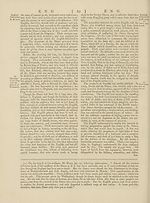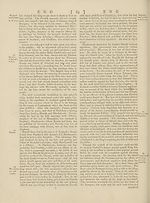Encyclopaedia Britannica, or, a Dictionary of arts, sciences, and miscellaneous literature : enlarged and improved. Illustrated with nearly six hundred engravings > Volume 8, ELE-FOR
(75) Page 63
Download files
Complete book:
Individual page:
Thumbnail gallery: Grid view | List view

ENG [ 63 ] ENG
jJngland. {Ions 'of tlic nobility. Edric had caufed his brother
‘ v ' Brightric to advance an accufation of treafon againlt
A. D. 10x3. ’W0}fnot}1 governor of Suffex, the father of the famous
Earl Godwin ; and that nobleman, knowing the power
and malice of his enemy, cpnfulted his own fafety by
deferiing with 20 thips to the Danes. Brightric pur-
fued him with a fleet of 80 fail -7 but his {hips being
{battered in a tempeft, and Itranded on the eoaft, he
was fuddenly attacked by Wolfnoth, and all his veffels
were burnt or other wife dcftroyed. The treachery of
Edric fruitrated every plan of future defence ; and the
whole navy was atlaft fcattered into the feveral harbours.
By thefe fatal mifcarriages, the enemy had leifure
to overrun the whole kingdom. They had now got
fuch a footing, indeed, that they could hardly have
bet m expelled though the nation had been ever fo una¬
nimous. But fo far did mutual diffidence and diffen-
fion prevail, that the governors of one province refu-
fcd to march to the affiftance of another ; and were at
lail terrified from affembling their forces for the defence
of their own. At laid the ufual expedient was tried.
A peace was bought with 48,000b 5 but this did not
procure even the ufual temporary relief. The Danes,
knowing that they wTere now mailers of the kingdom,
took the money, and continued their devaftations.
They levied a new contribution of 8000I. on the
county of Kent alone-, murdered the archbilhop of
Canterbury, who had refufed to countenance this exac¬
tion and the Engliffi nobility fubmitted everywhere
to the Daniffi monarch, fwearing allegiance to him, and
Ethclred giving hoftages for their good behaviour. At lail, E-
Bian [0,^°r"thclred himfclf, dreading equally the violence of the
«unc). enemy and the treachery of his own fubjeds, fled into
Normandy, whither he had already fent Queen Emma
and her two fons Alfred and Edward. The duke re¬
ceived his unhappy guells with a generofity which does
honour to his memory.
The flight of King Ethelred happened in the end of
the year 1013. He had not been above fix vreeks in
Normandy, when he heard of the death of Sweyn,
which happened at Gainfborough before he had time
to cftablitli himfelf in his new dominions. At the fame
time he received an invitation from the prelates and
nobility to refume the kingdom , exprefling alfo their
hopes, that, being now better taught by experience,
he would avoid thofe errors which had been fo fatal to
himfelf and his people. But the mifconducl of Ethel-
„ 73
Returns
but behaves red was incurable j and, on his refuming the govem-
as ill as
ever.
ment, he behaved in the very lame manner that he had
done before. His fon-in-law Edric, notwithftanding
his repeated treafons, retained fuch influence at court,
that he intlilled into the king jealoufies of Sigefert and
Morcar, two of the chief nobles of Mercia. Edric en¬
ticed them into his houfe, where he murdered them ;
while Ethelred partook of the infamy of this aftion, by
confifcating their eftates, and confining the widow of
Sigefert in a convent. She was a woman of lingular
beauty and merit *, and in a vifit which' was paid her,
during her confinement, by Prince Edmund the king’s
eldeft fon, the infpired him with fo violent an affection,
that he releafed her from the convent, and foon after
married her without his father’s confent.
In the mean time, Canute, the fon and fucceffor of
Sweyn, proved an enemy no lefs terrible to the Englifix
than his father had been. He ravaged the eaftern coait England.
with mercilefs fury 5 and put afliore all the Engliffi' v '
hoilages at Sandwich, after having cut off their hands ^ 101
and nofes. He was at latl obliged, by the neceffity of
his affairs, to return to Denmark. In a thort time,
however, he returned, and continued his depredations
along the fouthern coaft. He then broke into the
counties of Dorfet, Wilts, and Somerfet} where an
army was affembled againil him under the command of
Prince Edmund and Duke Edric. The latter ftill con¬
tinued his perfidious machinations 5 and after endea¬
vouring in vain to get the prince into his power, found
means to diffipate the army, and then deferted to Ca¬
nute with 40 veffels.
Edmund was not diflieartened by this treachery. He
again affembled his forces, and was in a condition to
give the enemy battle. Ethelred, however, had. now
Inch frequent experience of the treachery of his fub-
jefts, that he had loti all confidence in them. He re¬
mained in London, pretending licknefs, but in reality
from an apprehenfion that they intended to buy their
peace by delivering him into the hands of his enemies.
The army called aloud for their fovereign to march at
their head againft the Danes ; and on his refufal to
fake the field, they were fo difeouraged, that all the,
preparations which had been made became ineffeftual
for the defence of the kingdom. Edmund, deprived
of all regular refources for the maintenance of the fol-
diers, was obliged to commit fimilar ravages to thofe
praflifed by the Danes ; and after making feme fruit-
lefs expeditions into the north, which had fubmitted
entirely to Canute’s power, he returned to London,
where he found every thing in confufion by the death
of the king-. ,
& * m ' " Ha
Ethelred died m 1016, after an unhappy reign of Edmund
3 5 years 5 and was fucceeded by his eldeft fon Ed- Ironfide di-
mund, furnamed Ironjide on account of his great ftrength vi^es the
and valour. He poffeffed abilities fufficient to have ^
faved his country from ruin, had he come fooner to the £vuus.
throne; but it was now too late. . He bravely oppofed
the Danes, however, notwithftanding every difadvan-
tage ; till at laft the nobility of both nations obliged
their kings to come to a compromife, and divide the
kingdom between them by treaty. Canute referved to
himfelf Mercia, Eaft Anglia, and Northumberland,
which he had entirely fubdued. The fouthern parts
were left to Edmund. . This prince furvived the treaty
only about a month 5 being murdered at Oxford by two
of bis chamberlains, accomplices of Edric.
After the death of Edmund, nothing was left for Canute,
the Englilh but fubmiffion to Canute. The leaft feru-
pulous of mankind, however, dare not at all times
openly commit injuftice. Canute therefore, before he
ftized the dominions of Edwin and Edward, the two
fons of Edmund, fuborned fome of the nobility to de-
pofe, that, in the laft treaty with Edmund, it had
been verbally agreed, that, in cafe of Edmund’s death,
Canute fliould either be fucceflbr to his dominions, or
tutor to his children; for hiftorians differ with regard
to this particular. This evidence, fupported by the
great power of Canute, was fufficient to get him defi¬
ed king of England. Immediately after his acceffion
to the throne, he fent the two fons of Edmund to the
court of Sweden, on pretence of being there educated j
but
jJngland. {Ions 'of tlic nobility. Edric had caufed his brother
‘ v ' Brightric to advance an accufation of treafon againlt
A. D. 10x3. ’W0}fnot}1 governor of Suffex, the father of the famous
Earl Godwin ; and that nobleman, knowing the power
and malice of his enemy, cpnfulted his own fafety by
deferiing with 20 thips to the Danes. Brightric pur-
fued him with a fleet of 80 fail -7 but his {hips being
{battered in a tempeft, and Itranded on the eoaft, he
was fuddenly attacked by Wolfnoth, and all his veffels
were burnt or other wife dcftroyed. The treachery of
Edric fruitrated every plan of future defence ; and the
whole navy was atlaft fcattered into the feveral harbours.
By thefe fatal mifcarriages, the enemy had leifure
to overrun the whole kingdom. They had now got
fuch a footing, indeed, that they could hardly have
bet m expelled though the nation had been ever fo una¬
nimous. But fo far did mutual diffidence and diffen-
fion prevail, that the governors of one province refu-
fcd to march to the affiftance of another ; and were at
lail terrified from affembling their forces for the defence
of their own. At laid the ufual expedient was tried.
A peace was bought with 48,000b 5 but this did not
procure even the ufual temporary relief. The Danes,
knowing that they wTere now mailers of the kingdom,
took the money, and continued their devaftations.
They levied a new contribution of 8000I. on the
county of Kent alone-, murdered the archbilhop of
Canterbury, who had refufed to countenance this exac¬
tion and the Engliffi nobility fubmitted everywhere
to the Daniffi monarch, fwearing allegiance to him, and
Ethclred giving hoftages for their good behaviour. At lail, E-
Bian [0,^°r"thclred himfclf, dreading equally the violence of the
«unc). enemy and the treachery of his own fubjeds, fled into
Normandy, whither he had already fent Queen Emma
and her two fons Alfred and Edward. The duke re¬
ceived his unhappy guells with a generofity which does
honour to his memory.
The flight of King Ethelred happened in the end of
the year 1013. He had not been above fix vreeks in
Normandy, when he heard of the death of Sweyn,
which happened at Gainfborough before he had time
to cftablitli himfelf in his new dominions. At the fame
time he received an invitation from the prelates and
nobility to refume the kingdom , exprefling alfo their
hopes, that, being now better taught by experience,
he would avoid thofe errors which had been fo fatal to
himfelf and his people. But the mifconducl of Ethel-
„ 73
Returns
but behaves red was incurable j and, on his refuming the govem-
as ill as
ever.
ment, he behaved in the very lame manner that he had
done before. His fon-in-law Edric, notwithftanding
his repeated treafons, retained fuch influence at court,
that he intlilled into the king jealoufies of Sigefert and
Morcar, two of the chief nobles of Mercia. Edric en¬
ticed them into his houfe, where he murdered them ;
while Ethelred partook of the infamy of this aftion, by
confifcating their eftates, and confining the widow of
Sigefert in a convent. She was a woman of lingular
beauty and merit *, and in a vifit which' was paid her,
during her confinement, by Prince Edmund the king’s
eldeft fon, the infpired him with fo violent an affection,
that he releafed her from the convent, and foon after
married her without his father’s confent.
In the mean time, Canute, the fon and fucceffor of
Sweyn, proved an enemy no lefs terrible to the Englifix
than his father had been. He ravaged the eaftern coait England.
with mercilefs fury 5 and put afliore all the Engliffi' v '
hoilages at Sandwich, after having cut off their hands ^ 101
and nofes. He was at latl obliged, by the neceffity of
his affairs, to return to Denmark. In a thort time,
however, he returned, and continued his depredations
along the fouthern coaft. He then broke into the
counties of Dorfet, Wilts, and Somerfet} where an
army was affembled againil him under the command of
Prince Edmund and Duke Edric. The latter ftill con¬
tinued his perfidious machinations 5 and after endea¬
vouring in vain to get the prince into his power, found
means to diffipate the army, and then deferted to Ca¬
nute with 40 veffels.
Edmund was not diflieartened by this treachery. He
again affembled his forces, and was in a condition to
give the enemy battle. Ethelred, however, had. now
Inch frequent experience of the treachery of his fub-
jefts, that he had loti all confidence in them. He re¬
mained in London, pretending licknefs, but in reality
from an apprehenfion that they intended to buy their
peace by delivering him into the hands of his enemies.
The army called aloud for their fovereign to march at
their head againft the Danes ; and on his refufal to
fake the field, they were fo difeouraged, that all the,
preparations which had been made became ineffeftual
for the defence of the kingdom. Edmund, deprived
of all regular refources for the maintenance of the fol-
diers, was obliged to commit fimilar ravages to thofe
praflifed by the Danes ; and after making feme fruit-
lefs expeditions into the north, which had fubmitted
entirely to Canute’s power, he returned to London,
where he found every thing in confufion by the death
of the king-. ,
& * m ' " Ha
Ethelred died m 1016, after an unhappy reign of Edmund
3 5 years 5 and was fucceeded by his eldeft fon Ed- Ironfide di-
mund, furnamed Ironjide on account of his great ftrength vi^es the
and valour. He poffeffed abilities fufficient to have ^
faved his country from ruin, had he come fooner to the £vuus.
throne; but it was now too late. . He bravely oppofed
the Danes, however, notwithftanding every difadvan-
tage ; till at laft the nobility of both nations obliged
their kings to come to a compromife, and divide the
kingdom between them by treaty. Canute referved to
himfelf Mercia, Eaft Anglia, and Northumberland,
which he had entirely fubdued. The fouthern parts
were left to Edmund. . This prince furvived the treaty
only about a month 5 being murdered at Oxford by two
of bis chamberlains, accomplices of Edric.
After the death of Edmund, nothing was left for Canute,
the Englilh but fubmiffion to Canute. The leaft feru-
pulous of mankind, however, dare not at all times
openly commit injuftice. Canute therefore, before he
ftized the dominions of Edwin and Edward, the two
fons of Edmund, fuborned fome of the nobility to de-
pofe, that, in the laft treaty with Edmund, it had
been verbally agreed, that, in cafe of Edmund’s death,
Canute fliould either be fucceflbr to his dominions, or
tutor to his children; for hiftorians differ with regard
to this particular. This evidence, fupported by the
great power of Canute, was fufficient to get him defi¬
ed king of England. Immediately after his acceffion
to the throne, he fent the two fons of Edmund to the
court of Sweden, on pretence of being there educated j
but
Set display mode to:
![]() Universal Viewer |
Universal Viewer | ![]() Mirador |
Large image | Transcription
Mirador |
Large image | Transcription
Images and transcriptions on this page, including medium image downloads, may be used under the Creative Commons Attribution 4.0 International Licence unless otherwise stated. ![]()
| Permanent URL | https://digital.nls.uk/192264394 |
|---|
| Attribution and copyright: |
|
|---|
| Description | Ten editions of 'Encyclopaedia Britannica', issued from 1768-1903, in 231 volumes. Originally issued in 100 weekly parts (3 volumes) between 1768 and 1771 by publishers: Colin Macfarquhar and Andrew Bell (Edinburgh); editor: William Smellie: engraver: Andrew Bell. Expanded editions in the 19th century featured more volumes and contributions from leading experts in their fields. Managed and published in Edinburgh up to the 9th edition (25 volumes, from 1875-1889); the 10th edition (1902-1903) re-issued the 9th edition, with 11 supplementary volumes. |
|---|---|
| Additional NLS resources: |
|

